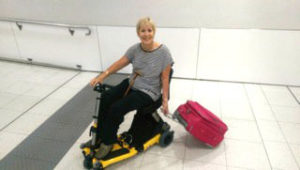NDIS
The NDIS is a government funded insurance scheme administered by the NDIA to support disabled people aged under 65 years, and their carers.
Scooters Australia


Book a Test Drive
Book a test drive and our team of experts will bring a range of scooters to you!
What is the NDIS and How Does it Work?

The NDIS is a scheme administered by the NDIA. It is a government funded insurance scheme to support disabled people aged under 65 years, and their carers. Each participant applies for assistance through completing the NDIS Plan, accessed through the NDIS website. More information on how to apply and the best way to improve your chances of a hassle-free application process can be found HERE.
Finances:
The economic rationale for spending $22Billion on support for disabled people is to create savings to the community of more than $22B.
This will be achieved by:
- Reducing medical costs
- Increases in tax receipts as a result of:
- Increasing employment for carers, providers, etc.
- Increasing employment for those previously un(der)-employed because of a disability
- Increased participation
- Increased engagement in the community
- Increased independence
- Creating increased demand for goods and services which will expand the economy
Key Words:
There are some words that are very usefull in attracting the best response from the NDIS assessors:
- Equity – ie enabling people who have a disability to have maximum access to normal life.
- Reasonable and Necessary – any expenditure must be reasonable, and be seen to be necessary to achieve equity.
- Best Value – must be able to demonstrate savings in other areas.
- Goals – each participant is urged to pursue specific goals:
- Empowerment – the key philosophy behind the NDIS is to give back the power of decision making to the end user.
See below for a link to our dedicated NDIS Info page for more detailed information on these key words and phrases.
What is the role of the Professional and the end user?
The KEY role for professionals is now as a facilitator of information. They will no longer be the final decision maker. The role will change from being a gatekeeper to being a facilitator.
The End User (the Participant) has now been given the power to be the decision maker. However, the participant has to be able to justify their choice if there is an alternative competitor at a better price, especially if the professional is aware of another product. And in the case of expensive capital equipment such as scooters, the NDIS specifies that an “experienced professional” must advise on the choice of product. So do your homework.
IMPLICATIONS:
The Participant is King (or Queen!).
The participant makes the ultimate decision, not the health professional. However, their choices must fulfill the criteria, especially the Key Words.
The participant must fill in The Plan – and submit it for approval by an administrator. Once it is approved and money allocated, then the participant can either use an advisor to seek help, or do the whole thing themselves, or a combination of both. Professionals are advisors – providers of information. Professionals can advise on finances and the best strategy, and can advise on possible purchases of equipment. They can, but do not necessarily have to power to submit quotes, etc, unless the participant asks them to. If you need the help of a professional, then we advise you to seek it.
The Plan.
The Plan is a very important document. Each participant must fill this in and submit it for assessment by a bureaucrat. It will determine whether you get help, what sort of help you get, and how long it will take.
There are three sections that are important:
- Part 1: About me. The more information the better
- Part 2: Goals. This is where it counts. Make sure the plan includes the Key Words.
- Part 3: Support: Make sure the equipment requested is described in specific terms.: Eg Travel Scooter, Four wheel large scooter, Three wheel small scooter, Collapsible scooter, etc.
But wait – there’s more. Lots more!
For more detailed assistance on how to fill in The Plan, or help others fill it in, CLICK HERE and you’ll find more detailed information, videos and assistance.
RECENT ‘NDIS’ ARTICLES:
Information for Occupational Therapists | Scooters Australia
Working with OTs to find the right solution for your client As an occupational therapist, it’s helpful to have a trusted mobility scooter supplier on

How to get a mobility scooter through the NDIS
The NDIS is a government funded insurance initiative, helping people under 65 with a disability and their carers receive the support, services and equipment they need

NDIS and the ILC Helped me Find a Scooter – Peta
I am a participant in the NDIS due to limited mobility. I had seen a LUGGIE (portable mobility scooter) and asked my care planner and

